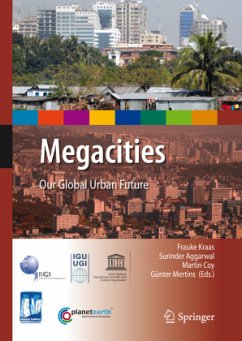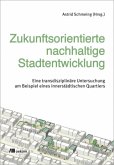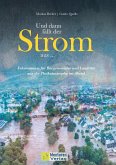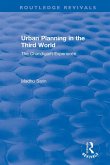As urbanization continues, and even accelerates, scientists estimate that by 2015 the world will have up to 60 'megacities' - urban areas with more than five million inhabitants. With the irresistible economic attractions of urban centers, particularly in developing countries, making the influx of citizens unstoppable, many of humankind's coming social, economic and political dramas will be played out in megacities. This book shows how geographers and Earth scientists are contributing to a better understanding of megacities.
The contributors analyze the impact of socio-economic and political activities on environmental change and vice versa, and identify solutions to the worst problems. They propose ways of improving the management of megacities and achieving a greater degree of sustainability in their development. The goals, of wise use of human and natural resources, risk reduction (both social and environmental) and quality of life enhancement, are agreed upon. But,as thistext proves, the means of achieving these ends are varied. Hence, chapters cover an array of topics, from health management in Indian megacities, to planning in New York, to transport solutions for the chronically traffic-choked Bangkok. Authors cover the impact of climate change on megacities, as well as less tangible issues such as socio-political fragmentation in the urban areas of Rio de Janeiro.
This exploration of some of the most crucial issues that we face as a species sets out research that is of the utmost importance, with the potential to contribute substantially to global justice and peace - and thereby prosperity.
The contributors analyze the impact of socio-economic and political activities on environmental change and vice versa, and identify solutions to the worst problems. They propose ways of improving the management of megacities and achieving a greater degree of sustainability in their development. The goals, of wise use of human and natural resources, risk reduction (both social and environmental) and quality of life enhancement, are agreed upon. But,as thistext proves, the means of achieving these ends are varied. Hence, chapters cover an array of topics, from health management in Indian megacities, to planning in New York, to transport solutions for the chronically traffic-choked Bangkok. Authors cover the impact of climate change on megacities, as well as less tangible issues such as socio-political fragmentation in the urban areas of Rio de Janeiro.
This exploration of some of the most crucial issues that we face as a species sets out research that is of the utmost importance, with the potential to contribute substantially to global justice and peace - and thereby prosperity.
From the reviews:
"This collection's 15 substantive chapters cover a range of issues from water quality and food security to social conflict, informal settlements, foreign direct investment, and e-governance. ... A work most suited to comprehensive collections. Summing Up ... Upper-division undergraduate and graduate students." (R. A. Beauregard, Choice, Vol. 51 (5), January, 2014)
"This collection's 15 substantive chapters cover a range of issues from water quality and food security to social conflict, informal settlements, foreign direct investment, and e-governance. ... A work most suited to comprehensive collections. Summing Up ... Upper-division undergraduate and graduate students." (R. A. Beauregard, Choice, Vol. 51 (5), January, 2014)








